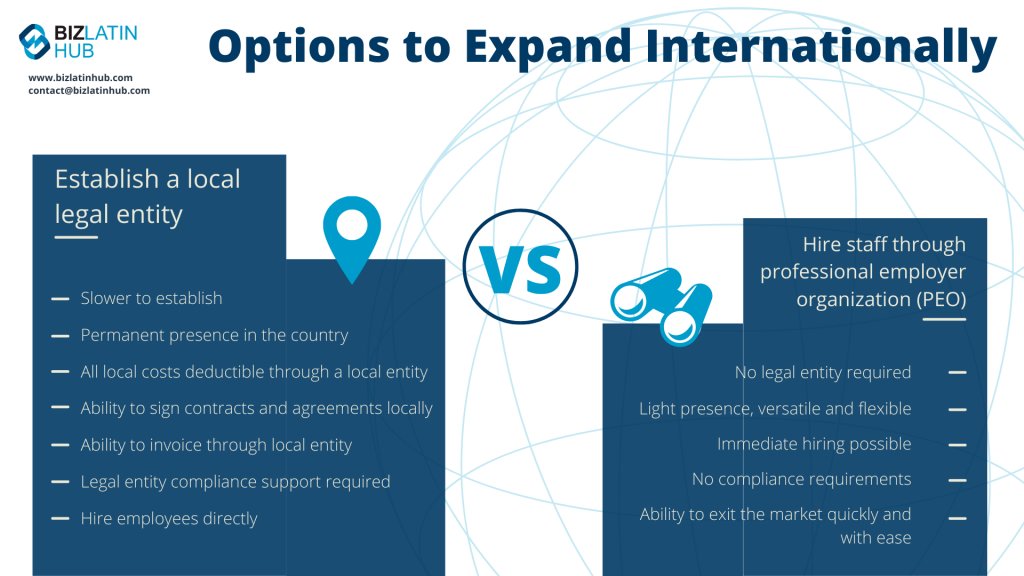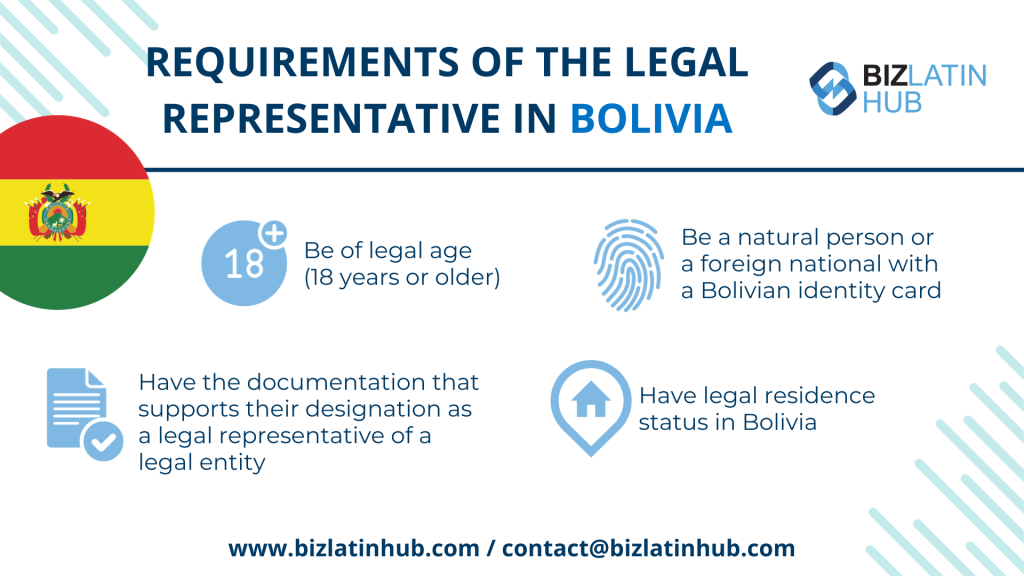Bolivia is a landlocked country at the heart of Latin America that is famous for its diversity. That’s why more and more international businesses are looking at company formation in Bolivia. The country’s economy has the necessary conditions to present lucrative opportunities, but the country is often overlooked by many foreign businesses, entrepreneurs and investors. This is tantamount to leaving money on the table as the hiring trends in Bolivia offer great opportunities to canny investors.
Key takeaways
| Key sectors experiencing hiring trends in Bolivia | The Bolivian economy is traditionally dominated by resource extraction and agriculture. In recent years, tech has become an increasingly important sector in the Bolivian economy, |
| 6 Steps to hiring Bolivian employees | A local advisor can help you with: Step 1: Job adverts Step 2: Networking Step 3: CV assessment Step 4: Interviewing Step 5: Contract writing Step 6: Onboarding |
| Legality of PEO to hire staff in Bolivia | Regulations allow foreign companies to hire employees through PEO providers in Bolivia. |
| Minimum wage in Bolivia | The Bolivian minimum wage for 2025 is Bs$2,500 (around USD$360) per month, applicable from the 17th of January. |
| Employer contributions for Bolivian staff | Employers must cover a range of payments, totalling 16.7% of an employee’s gross salary. |
What sectors are best for hiring in Bolivia?
The Bolivian economy is traditionally dominated by resource extraction and agriculture. An interesting development in recent years for the former has been lithium. The country is part of the ABC (Argentina, Bolivia, Chile) triangle that dominates known fields, meaning that this is an area of great potential.
In recent years, tech has become an increasingly important sector in the Bolivian economy, mirroring developments across the region. This follows a decades-long commitment to education that is now paying dividends. While the country is still lagging behind regional competitors, it is catching up fast and has great potential.
Hiring trends in Bolivia: Reasons to consider entering the Bolivian market
- High English proficiency
- Highly skilled workforce
- Promising education level
Let’s take a closer look at these factors:
- High level of English proficiency
Bolivia has the fifth highest English proficiency level in Latin America, according to some studies. The vast majority of Bolivians speak Spanish and/or one of the 36 official Indigenous languages. In recent years, English has been growing thanks to the fact that many school tech/IT textbooks are not available in Spanish. So if young people want to become tech workers, some level of English proficiency is a prerequisite.
- Highly skilled workforce
One study done on skills and job opportunities for Latin Americans, including Bolivia, showed that the vast majority of tech workers are highly skilled. The main skills they possess are:
- Adaptability
- Information processing ability
- Fluency in Spanish, English, or other languages
- Attention to detail
- Leadership
- Promising education system
Bolivia invests 23 percent of its fiscal budget to educational expenditures, a much higher percentage than any other country in the region. This is reflected in marked improvements to the national literacy rate, and has contributed greatly to Bolivia’s growing pool of tech talent.
Today, more than 50 public and private universities in the country offer degrees at both the undergraduate and postgraduate level, including in IT/tech related fields, ensuring a new generation of tech talent is ready to fill the jobs of tomorrow.

How much it costs to hire people in Bolivia
The cost of hiring in Bolivia is less than it would be in richer nations, yet workers are often well qualified and skilled. With significant investment in education over a number of years, the Bolivia now has a surfeit of graduates in the labor market that it cannot provide local jobs for. This means that the labor market in Bolivia is relatively competitive for an incoming prospective employer.
The minimum wage in Bolivia is Bs$2,500 (around USD$360) per month, applicable from the 17th of January. However, this is not necessarily the rate that you should be offering. In top sectors that require qualified and skilled workers, you will need to offer at least market standard rate. A local hiring expert in Bolivia will be invaluable in making sure that you are not overpaying or offering unattractive rates that make it hard to recruit quality talent.
Employers in Bolivia must make social security contributions equal to 16.7% of an employee’s wage and a thirteenth salary (known as an aguinaldo) must be paid as an annual bonus.
Two options for hiring: establish a company or PEO
When entering the market and hiring in Bolivia, there are essentially two options available to investors and entrepreneurs. The most common way of doing so is through full company formation to establish a presence in the jurisdiction. However, this may take time and effort, meaning that it is worth considering another option as well, using a Professional Employer Organization (PEO).
PEO: fast and agile
A Professional Employer Organization (PEO), also known as a ‘Registered Employer’ or ‘Employer of Record’, is an organization that provides and supports companies with their human resources functions, from the early stages of recruitment to the payment of taxes and benefits. PEOs undertake the fundamental and time-consuming tasks of human resources teams, allowing companies to focus on the growth and success of their business.
The services of a PEO are particularly useful when businesses seek to hire a local workforce but do not wish to establish a local legal entity. Simply put, a PEO makes it easy to hire staff in Bolivia through an outsourced provider. It means you can enter the market and start hiring quickly, without having to commit to full entry until you are sure that it is what you want to do. It is worth noting that regionally there is beginning to be more regulation and PEO in Bolivia may not be viable in the future.

The long-term option: direct hiring
This is the gold standard of hiring in Bolivia, as it will give you full control over your employees as well as being sure that you will be compliant for the long term. It also gives you a higher status with potential job applicants, who will see you as a more secure long-term employer.
Before you start hiring employees in Bolivia, you will first need to get a sense of the legal, financial and cultural lay of the land. Things such as how to sort out the red tape associated with incorporation and how to manage payroll, for example. With a permanent legal presence in Bolivia, you will be fully liable for compliance with local law.
A local expert will help when hiring in Bolivia, as they will have an extensive network of qualified professionals for top jobs as well as a good idea of the local labor market. They will be able to advise on the best rates to offer and what type of profile you should be targeting. With anti-discrimination legislation important in Bolivia, especially for top jobs, they can make sure you are making a fair offer which complies with local law.
After placing adverts and receiving applications, you will want to move towards interviewing potential candidates. This should be done by both a team manager and HR representative at minimum, to make sure that everything is watertight in legal terms. You may want to include other people into the process in order to make a better assessment of the candidate.
It is entirely possible that you may wish to have a second interview, possibly involving other team members as discussed above. It is also common in the region and when hiring in Bolivia to provide candidates with an aptitude task to be completed. This usually takes the form of a dummy task that simulates the type of job that will be done in the future and confirm that they possess the skills cited on their CV.
Contracts, too, will be important. A local advisor will be up to speed on what you can and cannot offer. Bear in mind that you will have to follow all the rules established by the country. In Bolivia, this includes a clear delineation on the conditions for termination of a contract for fixed work. The country only allows this under limited circumstances.
Finally, your local advisor will be able to help you with the stages of both the hiring and onboarding process. They will make sure that you comply with standard requirements such as compulsory medical checks and make sure that any probation period is within the boundaries of those established by the labor law in Bolivia. This is no more than three months except in exceptional circumstances.
Labor laws and regulations in Bolivia
Before making a move into the jurisdiction, it’s important for companies to understand the labor rights and responsibilities of both employers and employees in Bolivia. What follows are a few things that foreign business owners should know about when it comes to the local work culture:
Contract types – There are essentially two types of contract in Bolivia, indefinite employment and fixed-term employment. However, the latter is highly limited and the vast majority of workers are indefinitely employed.
Work hours – The standard workday in Bolivia is eight hours, with the standard workweek up to 48 hours. Two-hour lunch breaks are common, usually 12:30-14:30.
Public holidays – There are 11 public holidays in Bolivia each year.
Vacation time – Workers in Bolivia are eligible for 15 days of vacation annually. Women are entitled to NUMBER weeks’ maternity leave.

FAQs on hiring trends in Bolivia
Based on our extensive experience these are the common questions we receive from clients when looking to hire in Bolivia.
1. Why hire talent in Bolivia?
Bolivia is considered lower-middle income economically – and aside from a pandemic-induced dip – the country has seen consistent economic growth. There are still many aspects of the country that remain untapped, and hiring trends in Bolivia will be shaped by such factors.
Anyone who’s interested in doing business and investing in Latin America and the Caribbean should be giving Bolivia a closer look, as the Andean country’s future looks promising. Economists say the economy will continue to grow in the coming years, which will no doubt push up employment opportunities, and could even lead to a need to contract a headhunter in Bolivia.
2. Can I hire top talent in Bolivia?
The cost of hiring in Bolivia is less than it would be in richer nations, yet workers are often well qualified and skilled. With significant investment in education over a number of years, the Bolivia now has a surfeit of graduates in the labor market that it cannot provide local jobs for. This means that the labor market in Bolivia is relatively competitive for an incoming prospective employer.
One study done on skills and job opportunities for Latin Americans, including Bolivia, showed that the vast majority of workers are highly skilled. The main skills they possess are:
- Leadership
- Adaptability
- Information processing ability
- Fluency in Spanish, English, or other languages
- Attention to detail
3. What is the level of English for professionals in Bolivia?
Bolivia has the fifth highest English proficiency level in Latin America, according to some studies. The vast majority of Bolivians speak Spanish and/or one of the 36 official Indigenous languages. In recent years, English has been growing thanks to the fact that many school tech/IT textbooks are not available in Spanish. So if young people want to become tech workers, some level of English proficiency is a prerequisite.
4. How many software developers are there in Latin America?
The Association of Computer Science and Information Technology states that there are over 2 million tech professionals within Latin America.
Biz Latin Hub can help you with hiring trends in Bolivia
At Biz Latin Hub, we provide integrated market entry and back-office services throughout Latin America and the Caribbean, with offices in La Paz, Bolivia as well as over a dozen other major cities in the region. We also have trusted partners in many other markets.
Our unrivaled reach means we are ideally placed to support multi-jurisdiction market entries and cross-border operations.
As well as knowledge about hiring trends in Bolivia, our portfolio of services includes hiring & PEO accounting & taxation, company formation, bank account opening, and corporate legal services.
Contact us today to find out more about how we can assist you in finding top talent, or otherwise do business in Latin America and the Caribbean.
If this article on hiring trends in Bolivia was of interest to you, check out the rest of our coverage of the region. Or read about our team and expert authors.






